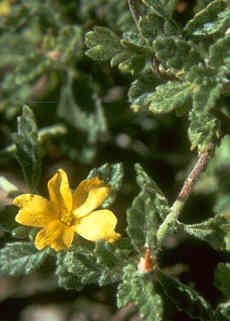
Plant Description
Caution & Interaction

Latin (botanical) name:
Turnera diffusa
Common names:Herba de la Pastora, Mexican Damiana, Old Woman's Broom, Rosemary
Plant Description:Damiana comes from a small shrub which has pale green leaves and yellow flowers that grow in the leaf axils. The small leaves are alternate or in bunches with serrate margins, and the underside is covered with pale hairs. They have a strong aroma somewhat like chamomile, and taste somewhat bitter and resinous. The fruits are small tripartite, slightly curved capsules. Preferring hot, humid climates, Damiana is native to Texas, Mexico and Central America.
Medicinal Properties &Uses: The chemical composition of Damiana is complex and not all components have been identified. However, the known make-up is 0.5-1% volatile oil, gonzalitosin (cyanogic glycoside), arbutin, tannin and damianin. The leaf also contains beta-sitosterol, which may account for the stimulant effect on the sexual organs. Damiana is used as a mild purgative or diuretic, which acts directly on the reproductive organs. It is used to treat such disorders as depression, lethargy, nervous dyspepsia, constipation, and coital inadequacy, and it is a valuable strengthening remedy for the nervous system. It is specifically indicated in anxiety neuroses with a predominant sexual factor. Damiana has been called the "lover's herb" due to its ancient reputation as an aphrodisiac, and is used as such in Germany and England. Because it carries oxygen and increases circulation to the genital area, it supports both male and female sexuality, even though, because the alkaloids are thought to have a testosteronal effect, it has been considered 'the male herb'. Damiana has been used, especially in Mexico, for orchitis (testicular inflammation), and to successfully treat exhaustion, bladder inflammation, impotence, and to contain genital herpes. Physicians in Mexico also use it to treat nephritis. It has been known to effectively treat bedwetting as well.
Dosage: 30-60 drops in water or juice, 2-3 times daily, or as needed. Shake well before using.
Cautions & Interactions: Keep out of the reach of children.
Efficacy Studies & Other Clinical Data:
Disclaimer (U.S. Only): These statements have not been evaluated by the FDA. These products are not intended to diagnose, cure, treat, or prevent any disease.
Common names:Herba de la Pastora, Mexican Damiana, Old Woman's Broom, Rosemary
Plant Description:Damiana comes from a small shrub which has pale green leaves and yellow flowers that grow in the leaf axils. The small leaves are alternate or in bunches with serrate margins, and the underside is covered with pale hairs. They have a strong aroma somewhat like chamomile, and taste somewhat bitter and resinous. The fruits are small tripartite, slightly curved capsules. Preferring hot, humid climates, Damiana is native to Texas, Mexico and Central America.
Medicinal Properties &Uses: The chemical composition of Damiana is complex and not all components have been identified. However, the known make-up is 0.5-1% volatile oil, gonzalitosin (cyanogic glycoside), arbutin, tannin and damianin. The leaf also contains beta-sitosterol, which may account for the stimulant effect on the sexual organs. Damiana is used as a mild purgative or diuretic, which acts directly on the reproductive organs. It is used to treat such disorders as depression, lethargy, nervous dyspepsia, constipation, and coital inadequacy, and it is a valuable strengthening remedy for the nervous system. It is specifically indicated in anxiety neuroses with a predominant sexual factor. Damiana has been called the "lover's herb" due to its ancient reputation as an aphrodisiac, and is used as such in Germany and England. Because it carries oxygen and increases circulation to the genital area, it supports both male and female sexuality, even though, because the alkaloids are thought to have a testosteronal effect, it has been considered 'the male herb'. Damiana has been used, especially in Mexico, for orchitis (testicular inflammation), and to successfully treat exhaustion, bladder inflammation, impotence, and to contain genital herpes. Physicians in Mexico also use it to treat nephritis. It has been known to effectively treat bedwetting as well.
Dosage: 30-60 drops in water or juice, 2-3 times daily, or as needed. Shake well before using.
Cautions & Interactions: Keep out of the reach of children.
Efficacy Studies & Other Clinical Data:
-
Herbal Treatment (including Damiana) in HIV and AIDS
- In the German scientific magazine Psychopharmacology was a report titled "Stimulating property of Turnera diffusa and Pfaffia paniculata extracts on the sexual behavior of male rats." This discussed a study conducted at the Dept. of Biomedical Sciences, Pharmacology Section, Univ. of Modena, Italy, in which the authors reported that "Sexually potent and sexually sluggish/impotent male rats were treated orally with different amounts of Turnera diffusa and Pfaffia paniculata fluid extracts (0.25, 0.50, 1.0 ml/kg). While having no effect on the copulatory behavior of sexually potent rats, both plant extracts--singly or in combination--improved the copulatory performance of sexually sluggish/impotent rats. The highest dose of either extract (1 ml/kg) (as well as the combination of 0.5 ml/kg of each extract) increased the percentage of rats achieving ejaculation and significantly reduced mount, intromission and ejaculation latencies, post-ejaculatory interval and intercopulatory interval. Neither extract affected locomotor activity. These results seem to support the folk reputation of Turnera diffusa and Pfaffia paniculata as sexual stimulants."
Disclaimer (U.S. Only): These statements have not been evaluated by the FDA. These products are not intended to diagnose, cure, treat, or prevent any disease.